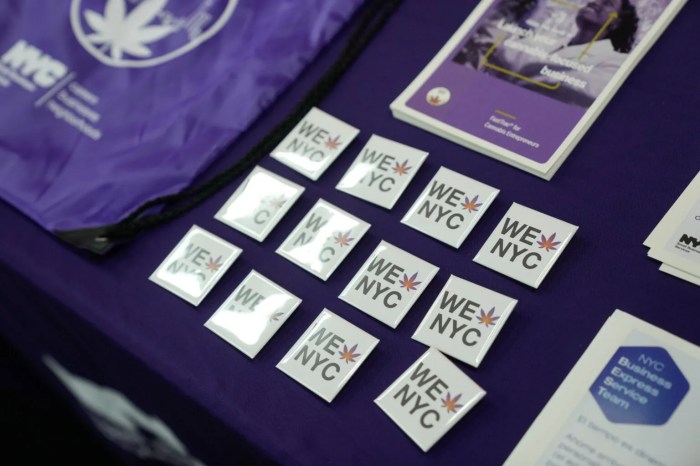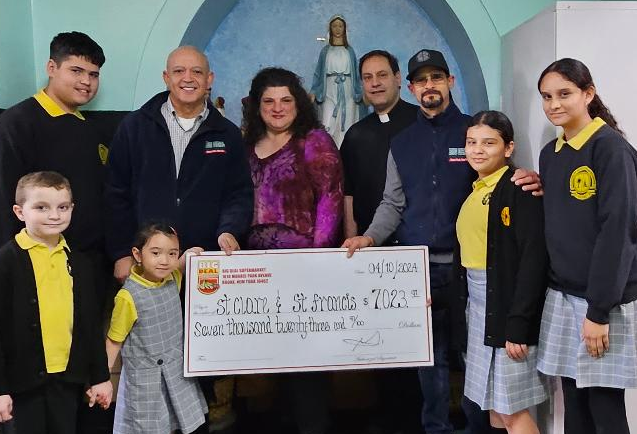Coalition of activists crosses Essex County to decry a mounting death toll
On February 28, a contingent of civic leaders and lesbian, gay, and transgender activists, led by police cars and three funeral hearses, marched along Central Avenue in New Jersey’s Essex County to raise awareness for what some participants said was a murder rate spiraling out of control.
On a sunny warm afternoon, about one hundred marchers gathered in a park in Orange and listened as Anthony Hall, a community activist spoke about the 2003 murder of seven-year-old Faheem Williams who was locked in the basement of a Newark home for days without food or water before being bludgeoned to death. “How many more kids have to die?” shouted Hall into a bullhorn.
Last May, Hall led street protests against the mayor of Newark, Sharpe James, following the murder of Hall’s cousin, Sakia Gunn, a 15-year-old who was stabbed at the downtown intersection of Broad and Market Streets while she waited for a bus with four other young lesbians.
Following the murder of Faheem Williams, whose body was discovered by police inside a plastic container, Sherry Murphy, a relative, and her 16-year-old son were arrested and charged with murder and Gov. James McGreevy ordered a shake up of the state’s Department of Youth and Family Services. The state placed Faheem and two other brothers in the Murphy home after their mother was arrested for assault.
Meanwhile, the Essex district attorney has charged Richard McCullough of Newark with the murder of Sakia Gunn and plans to prosecute the defendant under New Jersey’s seldom-used bias crime statute. If convicted under that statute, McCullough faces a longer prison sentence than if he were only found guilty of murder.
Joining Saturday’s march and helping display a gay and lesbian freedom flag was Amina Baraka, the mother of Shani Baraka, a popular Newark public school teacher who was murdered last August with her girlfriend, Rayshon Holmes, in Piscataway. In that case, prosecutors are holding James Coleman, Shani’s former brother-in-law, on domestic violence charges while they investigate the double homicide.
Baraka has always maintained that Coleman murdered the women and is confident he will be indicted for murder.
Since the tragedy, Baraka has been an outspoken advocate for lesbian and gay rights, joining the Newark Pride Alliance, the LGBT advocacy group that sprung up in the wake of the Gunn murder, as well as the recently founded Newark chapter of Parents and Friends of Lesbians and Gays, or P-Flag, the national support group for gays and lesbians with 250,000 members
Laquetta Nelson, NPA’s chairperson, joined the group’s other members alongside Amina Baraka, as did members of P-Flag.
Ellen Jililo, the executive director of Gay and Lesbian Pride of New Brunswick, pushed a stroller holding the twin children she and her partner are raising.
Several transgender activists, including Barbara Casbar and Rebecca Juro marched, as did Vanessa Essa, chairperson of the National Transgender Advocacy Coalition, who flew in from Texas for the event. Essa said the plight of Newark’s gay youth first came to her attention during the initial media coverage of the Gunn murder. “Being on the outside for so long, transgendered people can commiserate with the Gunn family,” said Essa. “A hate murder is a hate murder, period.”
On Saturday afternoon, however, the contingent of activists walked the length of Central Avenue without incident. Some marchers held signs that said, “Stop the Violence, Unity Now!” printed by the People’s Organization for Progress, a civic group that helped organize the march along with the United Youth Council, Inc. whose chairman, Salaam Ismial, said that the county needed increased funding for social programs to stem the incidence of violence that has impacted so many lives.
Walking through the predominantly working class African American and Latino communities of Orange, East Orange, and Newark, marchers were greeted by the stares of many residents apparently surprised at the unannounced presence of activists chanting “No justice, no peace,” and “Stop the killing.” While few took up the offer to join the procession, every bystander questioned supported the effort to raise awareness. Once they spotted the anti-violence signs, many drivers in the oncoming lane of Central Avenue honked their horns in support.
One corner bystander, Joe Muniz of Newark, said, “The police stop, right, and I could be going for a cigarette lighter and boom, boom—I get shot and they say, ‘I saw a gun.’” Muniz said he remembered Sakia Gunn’s name and that the young lesbian died as a result of being “a pretty girl killed because of gang violence.”
Darius Johnson, 14, and Wellington Hall, 15, Gunn’s cousins, said they were marching to support young gays and lesbians who are out. Both boys said they knew about Sakia’s sexuality at a young age and that since her death other young gays and lesbians in Newark’s public high schools are confident about coming out. “Since Sakia’s death, a lot of kids are gay because they feel more free,” said Johnson.
Officials in Newark’s F.B.I. office did not furnish up-to-date statistics on the county’s homicide rate, referring the request to the office of the Essex County prosecutor, which, in turn, did not return phone calls seeking the information.
We also publish:



































